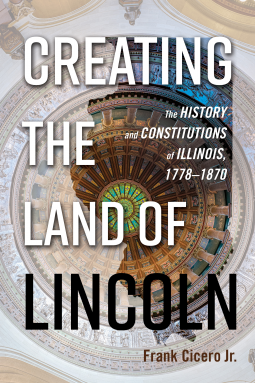
Creating the Land of Lincoln
The History and Constitutions of Illinois, 1778-1870
by Frank Cicero Jr.
This title was previously available on NetGalley and is now archived.
Send NetGalley books directly to your Kindle or Kindle app
1
To read on a Kindle or Kindle app, please add kindle@netgalley.com as an approved email address to receive files in your Amazon account. Click here for step-by-step instructions.
2
Also find your Kindle email address within your Amazon account, and enter it here.
Pub Date 15 Mar 2018 | Archive Date 22 Mar 2018
Talking about this book? Use #CreatingTheLandOfLincoln #NetGalley. More hashtag tips!
Description
In its early days, Illinois seemed destined to extend the American South. Its population of transplants lived an upland southern culture and in some cases owned slaves. Yet the nineteenth century and three constitutions recast Illinois as a crucible of northern strength and American progress.
Frank Cicero Jr. provides an appealing new history of Illinois as expressed by the state’s constitutions—and the lively conventions that led to each one. In Creating the Land of Lincoln, Cicero sheds light on the vital debates of delegates who, freed from electoral necessity, revealed the opinions, prejudices, sentiments, and dreams of Illinoisans at critical junctures in state history. Cicero analyzes decisions large and small that fostered momentous social and political changes. The addition of northern land in the 1818 constitution, for instance, opened up the state to immigrant populations that reoriented Illinois to the north. Legislative abuses and rancor over free blacks influenced the 1848 document and the subsequent rise of a Republican Party that gave the nation Abraham Lincoln as its president. Cicero concludes with the 1870 constitution, revealing how its dialogues and resolutions set the state on the modern course that still endures today.
Frank Cicero Jr. is a senior partner at Kirkland and Ellis LLP and served as a delegate for Illinois’s Sixth Constitutional Convention. He is the author of Relative Strangers: Italian Protestants in the Catholic World.
Advance Praise
“Well-written, clearly organized, traditional history that shows the changing issues in Illinois politics and government. The focus on the history of slavery is important and noteworthy. A real contribution.”--Ann Durkin Keating, author of Rising Up from Indian Country: The Battle of Fort Dearborn and the Birth of Chicago
“Extremely strong in research, clarity, and narrative. As I read, I knew was in the hands of a skilled researcher, one who had really mastered a complex sequence of events and learned and digested a complex set of political debates.”--Robert Michael Morrissey, author of Empire by Collaboration: Indians, Colonists, and Governments in Colonial Illinois Country
“Attractively written, this book provides a fresh look at underappreciated elements of Illinois’s state formation and early development, with compelling new insights into the story of the state’s constitutions.”--David Spadafora, President and Librarian, The Newberry Library
Available Editions
| EDITION | Hardcover |
| ISBN | 9780252041679 |
| PRICE | US$29.95 (USD) |
| PAGES | 264 |
Links
Featured Reviews
 Paul M, Reviewer
Paul M, Reviewer
The title of this book intrigued me enough to want to read it and once I had read the first few pages, I was hooked. As I progressed page by page I realised that I was a) enjoying the writing style, b) realizing that my knowledge on many of the topics raised was sorely lacking and c) learning how smart and driven some of the politicians and businessmen were in the emerging and developing Territory/State of Illinois.
From the very start, the different communities that started to settle in the areas that became the state of Illinois split the emerging state in both political and social viewpoints on a North/South split and reflected the origins of those communities. What I found fascinating was that the split went through all levels of communities and lasted for decades into what seems to be entrenched opinions with the growing city of Chicago becoming an entity unto itself.
Fortunately, there were enough men of foresight who pushed through the huge project of the Erie Canal despite contra pressures from some politicians and what seems to have been an extraordinary high cost of the project. As was proved in some very short years, the Erie Canal proved to be the critical factor that has led to Illinois becoming the powerhouse it is today.
The early years of Abraham Lincoln and his subsequent election to the Presidency set in the context of the emergence of the new State of Illinois was a perspective that I had not been exposed to before. It afforded the reader a better understanding of the man and his approach to life, the law and to people that was reflected in his actions until his untimely death.
A thoroughly enjoyable book that should be read by anyone who thinks they have an understanding on important periods of American History.





